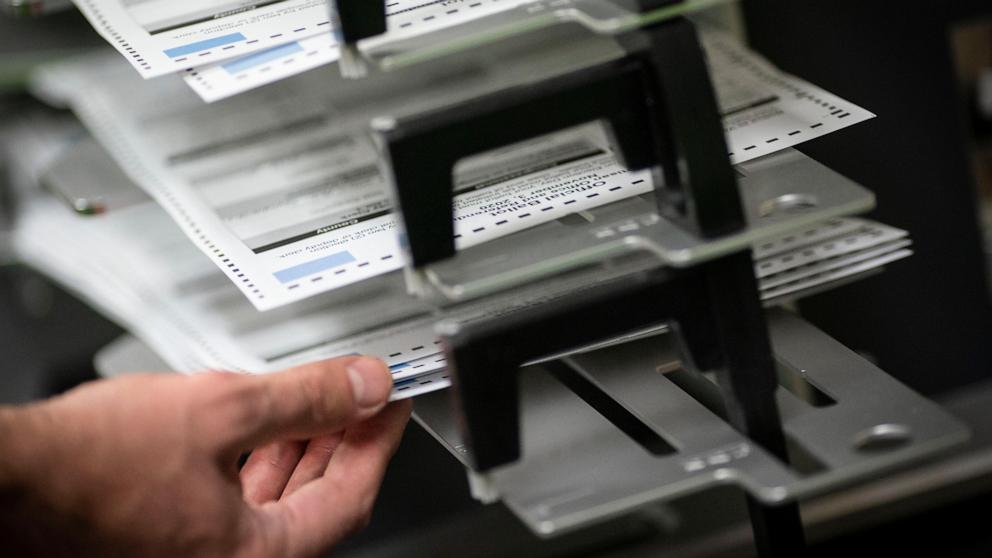A Wisconsin judge will consider this fall whether to allow people with disabilities in the battleground state to vote electronically from home.
by
Todd Richmond Associated Press
June 24, 2024 12:01 AM EST
• 4 min read
MADISON, Wis. — A Wisconsin judge will consider Monday whether to allow people with disabilities to vote electronically from home in battleground states this fall.
The Wisconsin Disability Rights Association, the League of Women Voters and four people with disabilities filed a lawsuit in April seeking to allow people with disabilities to vote absentee electronically from home.
The defendants asked Dane County Circuit Judge Everett Mitchell to issue a preliminary injunction before the lawsuit is resolved and accommodations can be made for the state’s Aug. 13 primary election and November presidential election. Judge Mitchell has scheduled a hearing on the injunction for Monday.
The question of who can vote absentee and where they can do so has become a hot-button political issue in Wisconsin, where four of the last six presidential elections have been decided by less than 1 percentage point.
In Wisconsin, any voter can cast a paper absentee ballot. Democrats have pushed to simplify the voting process in recent years, while Republicans have sought to restrict it. The liberal-leaning state Supreme Court is considering whether to overturn a previous conservative-leaning Supreme Court ruling banning absentee ballot drop boxes.
Those suing for the right to electronic absentee voting include Donald Natzke of Shorewood and Michael Christopher of Madison, both of whom are blind, Stacey Ellingen of Oshkosh, who has cerebral palsy, and Tyler Engel of Madison, who has spinal muscular atrophy.
They argue that many people with disabilities cannot cast a paper ballot without assistance, violating their right to a secrecy of the vote. They say providing electronic accessibility devices in people with disabilities’ homes would allow them to vote without assistance.
They also point out that Wisconsin elections allow military and overseas voters to vote absentee via electronic ballot. They argue that people with disabilities must be given the same opportunities under the Americans with Disabilities Act and the federal Rehabilitation Act, which prohibit all organizations that receive funding from discriminating on the basis of disability.
According to the Centers for Disease Control and Prevention, people with disabilities make up about a quarter of the adult population in the U.S. Just over 1 million Wisconsin adults, or one in four, have a disability, which the CDC defines as a difficulty with mobility, cognition, independent living, hearing, vision, dressing or bathing.
People with disabilities have fought multiple legal battles in recent years over access to polling places as many Republican-led states restrict how and when people can vote. Among the issues they have fought are restrictions on the type of assistance voters can receive and whether a voter’s mail-in ballot can be returned by someone else.
Wisconsin residents with disabilities were allowed to vote electronically from home until 2011, when then-Republican Gov. Scott Walker signed a Republican-drafted bill limiting electronic voting to only military and overseas voters.
Doug Poland, an attorney for the plaintiffs, said it was impossible to estimate how many people with disabilities would vote electronically from home in the August and November elections if the judge issues a preliminary injunction.
A federal court sided with disability rights activists in 2022, saying the Voting Rights Act applies to Wisconsin voters who need assistance with mailing or delivering their absentee ballot because of a disability. The ruling overturned a 4-3 ruling by the conservative Wisconsin Supreme Court at the time that said only voters could return their ballots in person or by mail.
Former President Donald Trump has falsely claimed that election fraud was to blame for his loss to Joe Biden in the 2020 election, but voter fraud is extremely rare in the U.S. An Associated Press review of all possible cases of voter fraud in six battleground states where Trump contested the results of the 2020 election found fewer than 475 cases, far from enough to have affected the outcome.

